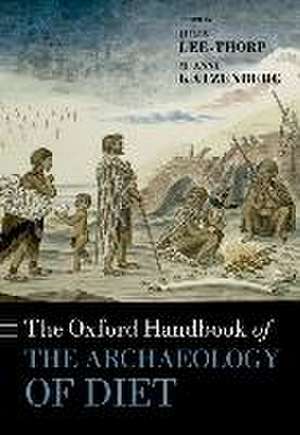The Oxford Handbook of the Archaeology of Diet: Oxford Handbooks
Editat de Julia Lee-Thorp, M. Anne Katzenbergen Limba Engleză Hardback – 4 iul 2024
Din seria Oxford Handbooks
-
 Preț: 236.89 lei
Preț: 236.89 lei - 8%
 Preț: 358.80 lei
Preț: 358.80 lei - 17%
 Preț: 912.51 lei
Preț: 912.51 lei - 12%
 Preț: 307.94 lei
Preț: 307.94 lei - 25%
 Preț: 829.05 lei
Preț: 829.05 lei - 14%
 Preț: 987.01 lei
Preț: 987.01 lei - 26%
 Preț: 1376.97 lei
Preț: 1376.97 lei - 29%
 Preț: 929.22 lei
Preț: 929.22 lei -
 Preț: 303.54 lei
Preț: 303.54 lei - 20%
 Preț: 343.85 lei
Preț: 343.85 lei - 14%
 Preț: 278.15 lei
Preț: 278.15 lei - 29%
 Preț: 930.94 lei
Preț: 930.94 lei - 30%
 Preț: 1065.79 lei
Preț: 1065.79 lei - 15%
 Preț: 357.85 lei
Preț: 357.85 lei -
 Preț: 263.45 lei
Preț: 263.45 lei - 23%
 Preț: 839.79 lei
Preț: 839.79 lei - 16%
 Preț: 264.39 lei
Preț: 264.39 lei - 33%
 Preț: 737.68 lei
Preț: 737.68 lei - 33%
 Preț: 725.45 lei
Preț: 725.45 lei - 26%
 Preț: 342.76 lei
Preț: 342.76 lei - 25%
 Preț: 366.95 lei
Preț: 366.95 lei - 13%
 Preț: 304.72 lei
Preț: 304.72 lei - 16%
 Preț: 263.35 lei
Preț: 263.35 lei - 12%
 Preț: 267.23 lei
Preț: 267.23 lei - 33%
 Preț: 815.51 lei
Preț: 815.51 lei - 13%
 Preț: 346.76 lei
Preț: 346.76 lei - 22%
 Preț: 1095.69 lei
Preț: 1095.69 lei - 29%
 Preț: 931.18 lei
Preț: 931.18 lei - 29%
 Preț: 942.77 lei
Preț: 942.77 lei - 24%
 Preț: 1071.82 lei
Preț: 1071.82 lei - 23%
 Preț: 1052.07 lei
Preț: 1052.07 lei - 21%
 Preț: 863.03 lei
Preț: 863.03 lei - 30%
 Preț: 815.25 lei
Preț: 815.25 lei - 29%
 Preț: 855.42 lei
Preț: 855.42 lei - 30%
 Preț: 842.04 lei
Preț: 842.04 lei - 11%
 Preț: 258.32 lei
Preț: 258.32 lei - 29%
 Preț: 859.51 lei
Preț: 859.51 lei - 29%
 Preț: 1083.61 lei
Preț: 1083.61 lei - 15%
 Preț: 273.41 lei
Preț: 273.41 lei - 30%
 Preț: 818.12 lei
Preț: 818.12 lei - 11%
 Preț: 365.23 lei
Preț: 365.23 lei - 21%
 Preț: 359.87 lei
Preț: 359.87 lei - 13%
 Preț: 264.87 lei
Preț: 264.87 lei - 9%
 Preț: 307.08 lei
Preț: 307.08 lei - 28%
 Preț: 845.79 lei
Preț: 845.79 lei - 23%
 Preț: 855.11 lei
Preț: 855.11 lei - 21%
 Preț: 861.04 lei
Preț: 861.04 lei - 12%
 Preț: 250.34 lei
Preț: 250.34 lei
Preț: 888.54 lei
Preț vechi: 1267.89 lei
-30% Nou
Puncte Express: 1333
Preț estimativ în valută:
170.02€ • 177.51$ • 140.71£
170.02€ • 177.51$ • 140.71£
Carte disponibilă
Livrare economică 03-10 martie
Preluare comenzi: 021 569.72.76
Specificații
ISBN-13: 9780199694013
ISBN-10: 019969401X
Pagini: 784
Dimensiuni: 180 x 252 x 45 mm
Greutate: 1.7 kg
Editura: OUP OXFORD
Colecția OUP Oxford
Seria Oxford Handbooks
Locul publicării:Oxford, United Kingdom
ISBN-10: 019969401X
Pagini: 784
Dimensiuni: 180 x 252 x 45 mm
Greutate: 1.7 kg
Editura: OUP OXFORD
Colecția OUP Oxford
Seria Oxford Handbooks
Locul publicării:Oxford, United Kingdom
Notă biografică
Julia Lee-Thorp obtained her PhD in Archaeology at the University of Cape Town in 1989, where she continued to work before her appointment as Research Professor of Archaeological Sciences at the University of Bradford in 2005. In 2010 she moved to the School of Archaeology, University of Oxford before retiring in 2019. She is best known for demonstrating the long-term integrity of stable isotopes in enamel, findings that opened opportunities to explore dietary ecology and environments in the distant and more recent pasts. She has carried out research across the globe, but her main focus remains in African archaeology and palaeoanthropology.M. Anne Katzenberg completed her PhD in Anthropology at the University of Toronto in 1983. After teaching there for two years, she accepted a position at the University of Calgary where she remained until her retirement in 2019. Her research focused on past human diet and the interaction of diet, disease, and population dynamics. She contributed to early research on the use of nitrogen isotopes for determining the duration of nursing and to debates on the timing of maize cultivation and intensification in North America. Her research collaborations include documenting riverine dietary adaptations in Texas and exploring population dynamics in ancient Paquimé, Mexico.
